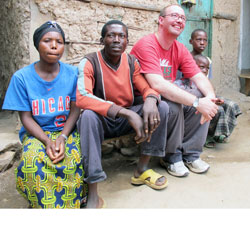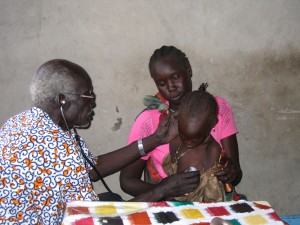Episcopal News Service has a great article today by Lynette Wilson on Ministerios Nuestras Pequeñas Rosas, Our Little Roses, in San Pedro Sula, Honduras.
Our Little Roses is a home for girls who have been abused, abandoned or orphaned. It is one of the best ministries I’ve ever seen – a refuge of love and care for those who are in such great need, most of all, to be loved. Diana Frade, the founder of OLR, is a friend of mine, and I’ve been privileged to visit and serve at Our Little Roses five times.
Twenty-five years ago, Diana started this ministry, as the article recounts, because she saw a need – for love – saw a way to meet that need, and made it happen. That’s mission. Diana and all those who have been involved in OLR are great role models for all of us, most of all because everything they have done, and everything they are doing, comes out of the bounty of their love.
From the ENS article:
Ministry empowers Honduran girls for life
[Episcopal News Service – San Pedro Sula, Honduras] Ministerios Nuestras Pequeñas Rosas began 25 years ago in a three-bedroom rental house in this gritty, factory town four hours from the capital, Tegucigalpa, because its founder, Diana Frade, recognized the need to educate and empower at-risk girls.
“I visited a boys’ home in Tegucigalpa, and could see the girls on the street,” said Frade, the founder, president and executive director of Ministerios Nuestras Pequeñas Roses, or Our Little Roses (OLR). “I thought, if the church is doing this for boys, why not for girls?”
Adhering to protocol, Frade introduced a resolution aimed at helping girls at a diocesan convention, but it failed – but she’d already promised judges (the court system manages child placement in Honduras) in Tegucigalpa a home for girls. So with $80,000 – part memorial gift, part matching grant – she rented a house and took in the first girl. By the end of the first year, there were 23 girls, a cook and two tias, or aunts, who at OLR handle the everyday needs, rearing and discipline of the girls living in the home, she said.
There are an estimated 200,000 orphaned children in Honduras, according to government statistics. Honduras, a Central America about the size of Tennessee, has a total population of about 8 million, close to 50 percent under the age of 18.
The first building, in Villa Florencia, was built in 1992 on property donated by the city’s mayor on two conditions, Frade said: OLR would be the legal name and listed on the legal documents, and the buildings would be designed in the style of San Pedro Sula. The home came first, and then came the infrastructure – water, sewer, electricity – and the neighborhood, she added.
Today, OLR covers 2.5 acres in Colonial Villa Florencia, five minutes from the central city, and includes Holy Family Bilingual School, serving the surrounding community; a residential home, where currently 56 girls, toddlers to teens, live together with their tias; and an off-site transition home for girls who have left the residential home and who are working and/or studying at a university. OLR Ministries also includes a medical clinic, a dental clinic staffed by Dr. Jensey Maldonado, who came to OLR with her sister when she was 9, and a recently completed mountain retreat and conference center, Our Lady of the Roses, in Santa Barbara, about an hour outside the city. ORL also has a Spanish-language school, offering instruction for students and housing on a weekly basis.
It was United Thank Offering, Episcopal Church Women and Daughters of the King who backed OLR from the beginning and it has been women, who recognize that “when you educate women you can change the future,” who have continued to support OLR, said Frade, who is married to the Rt. Rev. Leo Frade, bishop of the Episcopal Diocese of Southeast Florida.
“The women were so excited and got behind it,” she said. “This ministry is really quite unique, putting women and girls first; when you put women and girls first, you’re changing the generation to come.”
Click here to read the rest.














